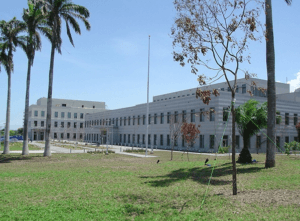Edited: How did fake US Embassy gang obtain legitimate visas?

When the US Department of State published information on the closure of a fake Embassy that has been operating in Ghana for 10 years, it said the criminals issued fraudulently obtained legitimate visas.
“The sham embassy advertised their services through flyers and billboards to cultivate customers from Ghana, Cote d’Ivoire, and Togo. Some of the services the embassy provided for these customers included issuance of fraudulently obtained, legitimate U.S. visas, counterfeit visas, false identification documents (including bank records, education records, birth certificates, and others) for a cost of $6,000,” it said.
The fake embassy also reportedly issued visas to other European countries, as well as counterfeit documents.
It is not clear when the criminals were busted but the information was posted on the Department of State’s website on November 2, 2016, the news however, went viral only after ghanabusinessnews.com broke it Friday evening December 2.
While US Embassy officials wouldn’t comment when the story broke, because they say investigation of the matter is ongoing, questions remain as to how the gang succeeded in using fraudulent documents to obtain legitimate visas.
A response however, from the Embassy in Accra stated that the criminals “used expired visas to create counterfeit visas,” adding, “we are not aware of anyone from our US Embassy in Accra being involved in this fraud operation. The visas were obtained through fraudulent, criminal activity.”
Meanwhile, a visa scandal hit an Embassy of a European country in Ghana in 2012, and the Ambassador was quietly recalled, and no reason was assigned. Some staff didn’t even know why.
A source who wasn’t authorized to speak to the media told ghanabusinessnews.com that employees at the said Embassy apparently were engaged in illegal issuance of visas, and the travellers were arrested at the country’s entry point. The travellers were caught because that country had joined a new visa system, and had changed its visas. But these travellers had the visa from the old system.
In an unprecedented move in 2006, Switzerland recalled its entire diplomatic staff including the ambassador from its Karachi mission when it was discovered that there was a massive visa fraud in its Islamabad Embassy, and visas for Pakistanis were halted at that time.
The fake US Embassy operating somewhere in Accra, was issuing genuine visas, the security team that closed it down said. They also found that a Ghanaian immigration lawyer working with some Turkish and other Ghanaian citizens was involved with the active connivance of Ghana law enforcement officers, who were apparently bribed to look the other way.
Visa acquisition in Ghana
Applying for visas in Ghana is a dreadful experience for any prospective traveller. The consular sections of almost all Embassies demand for proofs like birth certificate, bank statements, invitation letters, some with additional photocopies of hosts, and in some instances even their bank statements.
After providing all these, the Embassies demand that prospective travellers submit their applications in person and in most cases go through an interview, and yet many known qualified prospective travellers with no intention of remaining in these countries are denied visas.
There was a famous case of a medical professional that was invited to present a paper at a conference in Spain but was denied visa on the flimsy excuse that he didn’t satisfy the conditions for a visa, which in most cases means that the applicant is not likely to return to Ghana.
This medical expert then responded by writing a copious open letter to the Spanish Embassy in Ghana.
Connection men
Due to the frustrating experience in acquiring a visa to travel, especially to Europe and the US, the phenomena of connection men has sprung up. Prospective travellers desperate to leave Ghana are often reported to have paid huge sums of money for visas.
Human trafficking
This fake US Embassy that operated for 10 years, which category of travellers was it serving? Could they have issued visas to human traffickers? Because $6000 is a colossal amount that very few ordinary travellers can afford. It would therefore, not be out of place to assume that most of the clients of this criminal gang were human traffickers.
The crime of human trafficking is a lucrative illegal business generating an amount of $150 billion every year for traffickers.
By Emmanuel K. Dogbevi
Copyright © 2016 by Creative Imaginations Publicity
All rights reserved. This piece or any portion thereof may not be reproduced or used in any manner whatsoever without the express written permission of the publisher except for the use of brief quotations in reviews.
